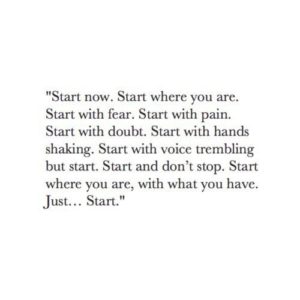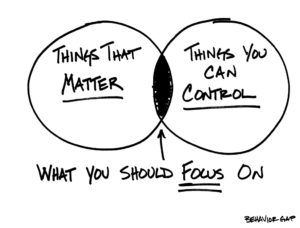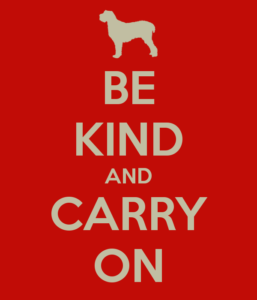By Liz Angeli, Julie Staggers, and Lisa Meloncon
The job search, when you have a job, is an intensely personal thing, which reiterates what Kristen said in her post about doing a narrow or broad job search your first time on the market.
Why do we say intensely personal? Because, you typically go on the market after securing a tenure-line job because of very personal things:
- Location: the location is simply someplace you cannot live or you have an intense longing to be closer to family, old lives, better amenities, etc.
- Fit: the department and/or university is not a good “fit,” which typically means that you thought you wanted this type of job and realized that you didn’t or the department and/or university doesn’t match what you want out of your career
- Aspirations: you landed at a teaching school or mid-tier regional and now you know without a doubt that you want to be at one of the bigger schools with graduate students, etc.
- Personal: sometimes you may never murmur out loud except to your partner, your family or your dog why you want out. You just do. And that’s ok, too.
All three of us have unique stories as to why we went on the market.
Julie has moved twice since tenure — once for an opportunity to work with grad students and contribute to a research institute that aligned with an emerging research interest, once to get closer to home and family. In neither case did she really consider herself “on the market.” Opportunities that aligned with changes in her scholarly and personal goals simply appeared at the right time. In both cases, she applied only for the one particular position that she eventually accepted. She offers this cautionary note: Pulling materials together for a single job application takes approximately the same initial effort as going on the market full-tilt.
Liz’s choice to go on the job market pre-tenure was primarily motivated by her family situation, and the position for which she applied aligned with her career goals: to work at institution that emphasized research. When she applied for her current job, she had just successfully completed her third-year review at her previous institution. She was not planning to go on the job market at that time, but she knew that jobs near her family wouldn’t come around often.
Lisa was encouraged to apply for a position and wanted to live in the location of another. So during her tenure year, she applied for two jobs. She was offered one job and was the top candidate at the other, but the search was cancelled due to budgets. As you can see, only Lisa didn’t make the move (for really intensely personal reasons).
The point is that doing a job search while you have a job is a different kind of search. We would recommend only going on the market when you have a job when you would be willing to take the job you are applying for. (yes, we aware of the advice that going on the market is a good strategy to get a raise. However, in most locations in TPC, starting salaries are better than other humanities disciplines.). This sort of job search is also a much more narrow search than your first time on the market, but as Julie says above, it still takes a lot of time.
Following we’ll go through some questions and answers that are pretty typical for this type of job search:
When do I go if I know I want to?
We tend to follow the advice that if possible to do it in your third year so you’ve had a chance (1) to figure out what you really want and (2) to build up your CV to make you marketable. Some folks used to say always go on the market in your tenure year just in case you don’t get it and you’ve already done all that self reflection and organizing. We would only advocate going on the market in your tenure year if you want another job based on the reasons noted above.
If you are tenured, then it is much easier to choose a time. You just do it.
Who do I tell?
We feel that it’s best to keep the job search as low key as possible. There’s no need to bring on ill will from your current colleagues or at the very least there’s no need to start people talking until there’s a reason.
Many states and/or institutions have to make job searches public so there is a point in any search that no matter what it has to be announced. Typically this is at the campus invitation stage where it is not uncommon to know who the other candidates are visiting campus because of these type of laws. If you want your search to stay as private and confidential as possible for as long as possible, it is a good idea to include a sentence in the final paragraph like “I would ask that this application be kept strictly confidential as long as possible under the hiring laws of your institution and the state of XX.”
How do I get letters?
A good rule of thumb for letter writers is to have writers who can address specific aspects of your professional profile such as someone whom you share a common research area with or someone from your teaching center who has visited your classroom. If you follow this rule, finding letter writers is not hard to do. You simply contact folks you feel comfortable with and ask them to write a letter that focuses on specific things.
However, if you have yet to cultivate these sorts of relationships (and this should be on your to-do list right after you get this job search business settled) then you have two options. First, you go back to your close networks at your graduate institution(s) and provide lots of details on what you’ve been up to. Or secondly, you may need to get a letter from someone at your present institution, which means you may need to tell a person (or two) whom you truly trust.
There is a lot of mixed advice on whether you have to have a letter from your current institution when you go on the market. If you are trying to keep your search under the radar, you are your own best judge of whether a letter from a colleague — especially an in-department colleague — is worth the potential risk of upsetting people if the cat gets out of the bag earlier than you intended. How have others been received when they have been on the market in your department? Typically, letters from colleagues in your present position attest to your collegiality. If you believe you really need a letter from your current institution, you might consider asking for a letter from someone you’ve worked closely with in your institution who is outside of your department.
What do I put in my cover letter as to why I am applying?
We are of the opinion that you need to be honest as possible without any negativity toward your current institution or colleagues. If you are applying to take a step up, then talking about wanting to do more research is a perfectly fine and acceptable explanation.
If you are making a lateral move (same type of institution and job) or taking a step down, being upfront is without doubt the best way to go. Toward the end of the cover letter (next to last paragraph is a good place), you can directly challenge the elephant in the room: “The reason I am applying is XYZ.”
Caveats: No matter what you say, there will be questions about this during interviews and campus visits and sidebar conversations and email exchanges so you need to think long and hard about the answer(s) to this question.
What do I need to have done to be able to make this move?
This is a tricky question. If you’re wanting to move up to an institution that is higher ranked (either by Carnegie Classifications or based on the recognition of the programs) then you need to be certain that you look like the folks there at the same period in time. In other words, if you’re in your third year, then you need to look just like someone in their third year at the institution in which you are applying.
So then you are prompted to ask, “how do I know what that looks like?” Well, this is where it gets a little tricky because you may not look like that but you could make up for lost time if you had more time or you may look sort of like that but it’s because you’re doing the thing they really want but they don’t understand the time it takes or …..see how it can get tricky.
We hesitate to make a blanket statement about production because we have (especially women) tended to overproduce so we will encourage you to do research and then talk to trusted advisors. All of us would be happy to talk with you (and Lisa has a whole slew of tenure documents to help guide those conversations!).
Can I apply for a job as assistant if I just got tenure? Or can I apply for a new assistant when I am an advanced?
The answer to both of these questions is yes, especially if you, your research, and teaching profile fit what the institution is asking for in the job ad. We would recommend that you acknowledge differences directly in your letter. For example, If you’re an advanced assistant applying for an assistant position, consider acknowledging this difference in your letter by stating, “I realize that I am an advanced assistant professor applying for an assistant position; I am applying because . . . ” You might even want to state that you’re willing to start as an assistant professor if you truly are willing to and if this job and move are worth it.
Also, we would also recommend that you contact the search committee chair and talk to them (on the phone) about your considerations for applying for the job. In most cases, the search chair will find ways (within the legal and institutional limits of the search) to let you know what the committee may be willing to consider and to not consider.
With all tenure-track lines so precious, no one wants to waste one so it’s best for all involved to know ask questions.
The job search when you have a job still means that you need to put a lot of time and attention into your cover letter and CV. In many ways, it’s harder and you’ll need more time because you’ve done more, which makes it difficult to decide what to include. This is why it’s so important to know who you are as a scholar and teacher. Because the length of the cover letter isn’t much longer. You’ll have a little extra because you’ll have publications to use as writing samples, and you should already have a teaching philosophy and research statement drafted (somewhere!).
Please feel feel free to reach out to any of us with additional questions or concerns.
Wishing you the best of luck!
 One of the good things about this job is that we consistently get the chance to start over. We have, at minimum, two terms a year where we can start fresh and new. We have the summer where we can start “catching up” or focusing solely on one task or another. That’s quite a gift in its own way.
One of the good things about this job is that we consistently get the chance to start over. We have, at minimum, two terms a year where we can start fresh and new. We have the summer where we can start “catching up” or focusing solely on one task or another. That’s quite a gift in its own way.

